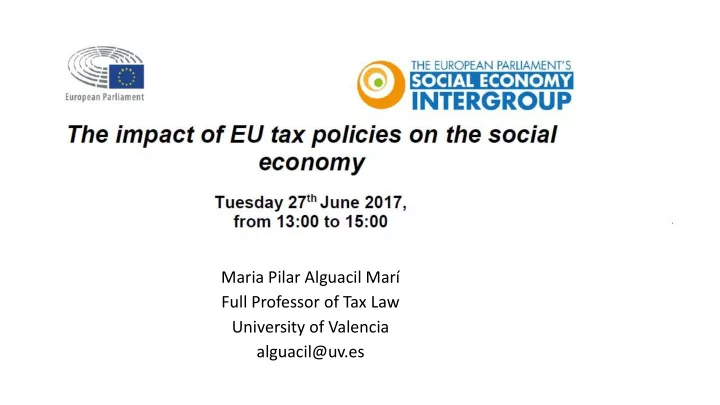

Maria Pilar Alguacil Marí Full Professor of Tax Law University of Valencia alguacil@uv.es
EU policies Proposal of Directive in Common Corporate Tax Base State aid rules
Corporate taxation on SE undertakings • Tecnichal: • Incentives: • Have into account differences • Accomplisment of social and territorial cohesion goals • Compensation of overcost because of working in “market failure” áreas (social services, • Corporate tax base agricultural, employment, etc) • AFFECTED BY PROPOSAL OF • AFFECTED BY STATE AID DIRECTIVE ON CCTB
CCTB Scope Provisions affecting cooperatives • Article 12 Non-deductible items • Affecting specially to • By way of derogation from Articles cooperatives (Annex I) 9 and 10, the following items shall • It will be the seed of the CTB be non-deductible: harmonisation in EU • profit distributions and repayments of equity or debt; • (…) • the transfer of retained earnings to a reserve that forms part of the equity of the company;
Profit distribution Countries treating as bonuses Countries treating as dividends • They are considered income of • The income from operations the member, and not the with members are slightly best cooperative treated in order to avoid the double taxation ( smaller tax • So the distribution is not taxed rate) at the cooperative tax base, but in the income tax of the • Interest paid on equity is member deductible
Transfer of earnings to a reserve • Some countries have regulated • 2 kind of reserves compulsory transfers to non- • A) Financial: to balance the distributable reserves variability of equity, and the dificulty of accesing to finance • B) Solidarity: usually to promote cooperativism, or other goals of Social Corporate Responsability • The profits are totally or partially • (not covered by art. 9.4 about reduced gifts to charitable bodies)
Conclusions on CCTB • So these cooperatives would not be allowed to choose the CCTB system. • In my opinion, differences between cooperatives and other undertakings could justify different treatment when calculating the income for tax purposes (as pointed out by Court of justice ruling of September 8th 2011) • This aggravates the situation of cooperatives, that have lost plenty of their special regimes in the last years.
State aid Cooperatives Social undertakings • They have special treatment in • Not having usually any tax some countries, alghough they incentive, although: are very poor. • their accomplishment of very • Even so: important social goals, • Problem with selectivity element • and the assuming of social costs as these are related to derived of the “market failure” undertakings by their “legal form”
Cooperatives The procedures of the Commission, and the ruling of the Court covered also the same subjects: • Taxation on profits by operations with members (distributed or not) • Allocation of profits to non-distributable reserves The Court pointed out the differences of cooperatives, as much as they follow the criteria set up by: Regulation on European Cooperative Comunication on the promotion of Cooperative societies in Europe
Social business: social services of economic general interest • It is raised more than once if Social Economy undertakings are providers of Services of Economic general interest, because of their peculiar way of functioning • In Spain, Special employment centres (for disabled people) and Work integration social enterprises have been declared Organizations providing Services of economic general interest by Law on Social Economy, in 2015 • That following the lead of the Social Business initiative • First time it is declared to a SE undertaking just because of being itself
Implications • The declaration would be considered the act of entrustment required by the Almark ruling, about the provisions of art. 106 TFEU • This article stablishs a more favourable régimen for State aid than the general rule contained in art. 107. • But it is very difficult for tax regulations to meet the requirements for notification exemption ( and the legal certainty attached) because they are not “transparent” • This is a very important setback in order to Member States to regulate some fiscal incentives.
CONCLUSIONES • Tax treatment on SE undertaking in European countries is probably reflecting very poorly the social goals they accomplish and the overcosts they carried out. • Any tax incentives are threatened also because of the uncertainty of the legal framework of State aid. • The framework of the services of general economic interest would be a good approach to the treatment. Even so, fiscal incentives could not meet the criteria to be exempted. This situation would have to changed. • Even the technical rules could be erased by the CCTb.
So, it would be convenient - To take notice of the specifities of tax treatment of SE undertakings in Europe, - To amend the CCTB proposal - To study the possibility of applying SGEI to a number of SE undertakings - To change the rules about transparency of State aid for SE tax mesures, or at least some of them - To improve the tax treatment of SE providing social services all over European countries
Recommend
More recommend